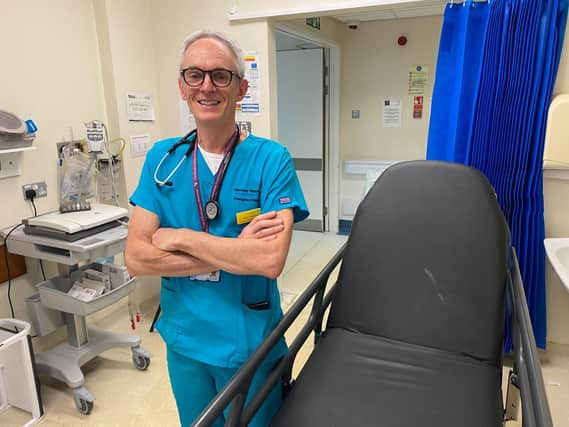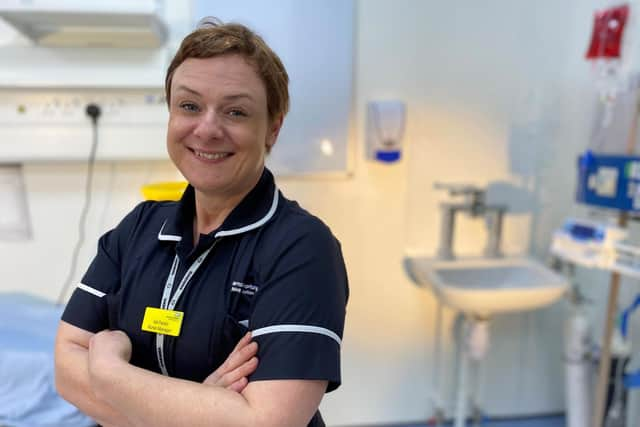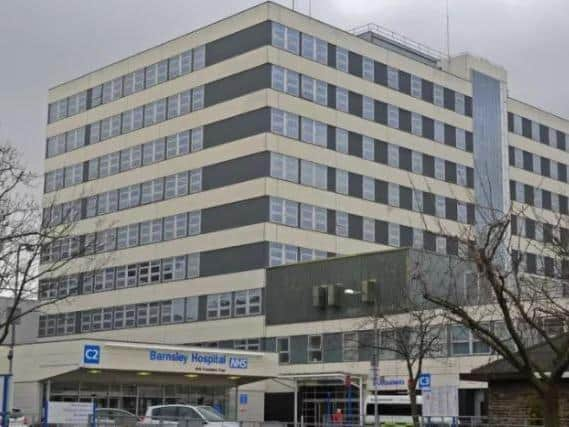How Covid-19 'tidal wave' has transformed one Yorkshire emergency department


“It was almost like watching a tidal wave coming towards you – you know it is coming but there is very little you can do to stop it,” Dr Julian Humphrey says of the experience of watching Covid-19 spread across the world in the weeks and months before the pandemic took hold in Yorkshire. “We knew it was coming but had to prepare for it.”
Humphrey is the clinical lead at the emergency department at Barnsley Hospital, which, just like every A&E unit across the country, has had to transform its working practices almost overnight to deal with coronavirus.
Advertisement
Hide AdAdvertisement
Hide AdAs of Friday, 113 patients with coronavirus have died at the hospital since the outbreak began. Humphrey, who was in the RAF for 10 years before qualifying as a doctor in his 30s after studying at night school, says that the situation could have been much worse had the national lockdown not taken place.


“Without lockdown, we would have been completely overwhelmed,” he says. “With such a vicious, virulent virus we would have been in real trouble.”
Barnsley’s preparations for the outbreak included effectively doubling the size of its emergency department and then splitting into separate ‘hot’ and ‘cold’ sections; with the former just for suspected coronavirus patients and the latter for those not believed to have the virus.
It is a far cry from how the emergency department used to operate; with a weekly reminder of precisely how much has changed currently being shown on national television.
Advertisement
Hide AdAdvertisement
Hide AdThe third series of Channel Five documentary Casualty 24/7 which is filmed in the department is broadcast on Wednesday nights, with the current run of episodes all filmed last year before the existence of Covid-19.


Humphrey says the show depicts a very different situation to the one staff now operate in.
“If you watch any of the programmes, the department is chock-a-block so if you think about social distancing, there is none. Emergency departments were very crammed places when things were normal.
“There is going to be social distancing for a while and the challenge of that for A&E departments is immense.
Advertisement
Hide AdAdvertisement
Hide Ad“We have been very crowded and pressured and stressed for several years and it has been getting worse and worse. Every winter is worse.
“At the moment the department has expanded and we have essentially doubled the floor space, the hot and cold areas are geographically separate.
“Covid-19 has basically changed the landscape of the emergency department and it could have very long-term implications as to what we actually do. It has been a very challenging and interesting time.”
Humphrey had been due to move to Australia to work in a hospital near Perth for a year but the move was cancelled as borders shut around the world as a result of coronavirus.
Advertisement
Hide AdAdvertisement
Hide AdHe says being on the frontline in Yorkshire has been an intense but rewarding experience. “We knew it was coming and had to prepare for it. The planning at Barnsley meant we were never close to being overwhelmed.
“We did have a couple of busy weeks with lots of patients with Covid-type symptoms and were admitting lots to intensive care. Patients were coming through and you knew exactly what was wrong with them, there was no doubt. They would be extremely short of breath, have high temperatures, be feeling dreadful and with fear in their eyes because they knew how serious it is. They also had no family with them so were facing all this alone with staff around them in protective equipment.
“For patients it was incredibly difficult and for the staff, we found it incredibly difficult. In PPE, everything takes a lot longer and there is almost a physical barrier between you and the patient. It is the biggest challenge the NHS has faced in my lifetime. I don’t think we have had anything close to the things we have had to do to face up to this.
“This challenge has brought out the best in the NHS. The amount of pressure the NHS has been under in the last four to five years has been racking up and up then you get coronavirus. It has been incredibly stressful for everybody involved on a professional level and a work family level. We have had to support each other through this.
Advertisement
Hide AdAdvertisement
Hide Ad“We have forgotten what ‘normal’ is now and some people would say we don’t want to go back to corridor medicine again. There is a great opportunity now given the crisis we have been through to think about how we have been working and realise we can’t really go back to what we were doing before.”
Humphrey says personal fears about potentially catching the virus have to be put to one side in his role.
“I have been in the military where you get paid to put your life on the line. In the health service, you put that to the back of your mind and you get on with your job. We had our PPE and we had very few staff actually go down with Covid. I think that is a reflection that we had been able to get an adequate level of PPE and the change the way we work.”
That determined view is echoed by clinical nurse manager Val Parkin, who has been working in Barnsley for 15 months having previously been based in Sheffield at the major trauma centre at the Northern General Hospital for 20 years.
Advertisement
Hide AdAdvertisement
Hide AdIn charge of a team of around 145 nurses, Parkin herself took the swabs from the first patient with suspected coronavirus to arrive at the hospital. She admits that at the beginning of the crisis, there was a level of fear among staff.
“I trust the ability of my team but when you saw the pictures coming from China, then Italy and Spain, you think, ‘wow, is this going to hit us that hard?’ There was a bit of fear. But when I became a sister I was advised to ‘become a swan’ – be calm and graceful on the surface but paddle away furiously underneath. You have to do that because your team have got to trust you.”
But she says she was not phased when dealing with the first patient while wearing her PPE.
“At the end of the day my job is about looking after patients - if the patient has got a disease my first priority is making them feel comfortable and trying to relieve any anxiety. Initially there was a bit of fear around but once you put on your uniform, it almost become like your armour.”
Advertisement
Hide AdAdvertisement
Hide AdParkin, who is originally from Ireland, says she has wanted to be a nurse from the age of five after spending six months in hospital recovering from third-degree burns.
“One of my earliest memories is the nurses being so lovely and caring to me and they used to kind of let me get involved in checking the other children were alright. From then, I just wanted to help people.
“I’m as enthusiastic today as I was when I first started. The passion I feel is amazing and I’m so lucky to be surrounded by such amazing nurses.”
She says her career has involved witnessing many tragic situations.
Advertisement
Hide AdAdvertisement
Hide Ad“In truth they never leave you. I take great comfort in my colleagues, they have been a godsend. You learn to adapt but there are times it creeps up on you.
“I still vividly remember the first young death I dealt with. It was a 17-year-old who had been in an RTC [road traffic collision]. I can still see his face.
“They stay with you for a reason - in emergency nursing you meet people and invest in their progress. It is quite a privilege to be there at the beginning or end of somebody’s life and I take a lot of comfort in providing really good nursing care."
She says the current situation is unprecedented but one she and the rest of the department have risen to.
Advertisement
Hide AdAdvertisement
Hide Ad“I love a challenge. I have been in emergency nursing for 20 years, it is my bread and butter and the reason I get out bed in the morning. We were doing a lot of thinking on our feet in trying to create the new care model. I’m so, so proud of my team, they have gone with every single change.”
Parkin says one of the biggest challenges has been patients being unable to see their families; with staff arranging video calls and handing out knitted hearts donated by local people - with matching ones given to the patient and a relative so they can feel connected and bring them back together when people are discharged.
She says it has been encouraging in some respects to see more patients presenting at A&E with symptoms more typical for an emergency department.
"When the crisis first started, people were scared of coming into hospital because they thought they might get coronavirus. But the risk is probably the same in the cold area of the hospital as in the community.”
Advertisement
Hide AdAdvertisement
Hide Ad“What we have found is people with a moderate illness like hip pain that has been a niggling problem are starting to come back. We have been firm from the beginning that it is business as usual. We don’t want to turn people away - it is not what we do.”
Humphrey says that while it has been very positive to see Covid cases decline to the point where the ‘cold’ side of the emergency department is now much busier than the hot, he does have concerns about a potential second wave of infections.
“It really depends on how many have actually had it within the population of Yorkshire. Nobody knows that figure.
“If you have had it there is a high change they are going to be immune and not spread it. So if that level of infection is reasonably high in the community, the virus has less chance of spreading. I don’t think the level of infection with the Yorkshire population is very high. If there is a second wave there is more chance of it hitting quite hard. That is a challenge.
Advertisement
Hide AdAdvertisement
Hide Ad“I don’t think anybody knows what will happen in terms of a second wave.”
Humphrey, who is originally from Kent but has worked in Barnsley since 2004, says the staff have been deeply grateful for the support they have received from the local community during the crisis.
“One of the reasons I haven’t moved from Barnsley is our patients are really genuine people. They are very honest and straight-forward and the other thing is they are very thankful for what we do for them.
“During the Covid crisis we have had lots of donations of things like PPE - masks and goggles, even laundry bags with staff initials on them.
Advertisement
Hide AdAdvertisement
Hide Ad“I think that is a real indication of how much the hospital is appreciated in the community.”
Filming 'becomes second nature'
Val Parkin says she was initially unsure about appearing on the television documentary, but has since grown to appreciate the experience.
“It was a running joke between myself and my friends from my previous job that I was going to end up on television and I would say, ‘Absolutely not’.
“But I’m absolutely passionate about emergency nursing and I just wanted to show how special it is what we do.
Advertisement
Hide AdAdvertisement
Hide Ad“It comes across as very real because you forget you are being filmed. It was not something I came in thinking I would do but I really enjoyed it.”
Casualty 24/7 airs on Wednesday May 27, 9pm on Channel 5.
**********************
Editor’s note: first and foremost - and rarely have I written down these words with more sincerity - I hope this finds you well.
Almost certainly you are here because you value the quality and the integrity of the journalism produced by The Yorkshire Post’s journalists - almost all of which live alongside you in Yorkshire, spending the wages they earn with Yorkshire businesses - who last year took this title to the industry watchdog’s Most Trusted Newspaper in Britain accolade.
And that is why I must make an urgent request of you: as advertising revenue declines, your support becomes evermore crucial to the maintenance of the journalistic standards expected of The Yorkshire Post. If you can, safely, please buy a paper or take up a subscription. We want to continue to make you proud of Yorkshire’s National Newspaper but we are going to need your help.
Advertisement
Hide AdAdvertisement
Hide AdPostal subscription copies can be ordered by calling 0330 4030066 or by emailing [email protected]. Vouchers, to be exchanged at retail sales outlets - our newsagents need you, too - can be subscribed to by contacting subscriptions on 0330 1235950 or by visiting www.localsubsplus.co.uk where you should select The Yorkshire Post from the list of titles available.
If you want to help right now, download our tablet app from the App / Play Stores. Every contribution you make helps to provide this county with the best regional journalism in the country.
Sincerely. Thank you.
James Mitchinson
Editor